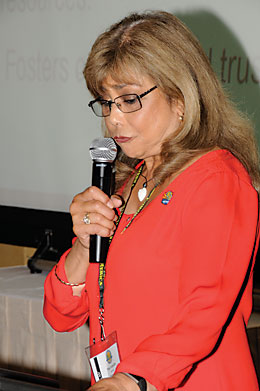 |
||||||||||||
|
2016 VVA Leadership & Education Conference, September/October 2016 Recognizing And Living With PRESENTED BY NINA SCHLOFFEL, ELAYNE MACKEY,
The symptoms of secondary PTSD are much the same as those for primary PTSD: no sense of purpose, excessive anger, anxiety, concentration problems, hypervigilence, hopelessness, feeling over-whelmed, and self-destructive behavior. These problems, when exaggerated in PTSD, cause families to feel isolated. There is detachment from one’s world. There is a disconnect, even with who one used to be. There is no energy. Guilt enwraps the family. Veterans feel guilty because they have been through horror too awful to talk about—or it is all they can talk about. There is guilt over endless nightmares and flashbacks, and over bouts of anger. If such imbalance goes on long or intensely enough, loved ones take on the burden, too. This is secondary PTSD. Spouses and children feel as if they have been in a war zone themselves. Brains often do not distinguish between physical reality and emotional reality. Given empathy between people who are close, family members pick up emotions that did not originate with them. Try not yawning when you see someone else yawning. If we are so susceptible to yawns, think how much more we would pick up a loved one’s experiences and pain. Cortisol is the great stress hormone. This steroid warns us of danger and drives us to react. But if stress becomes too great, cortisol can be corrosive. It causes physical pain, muscle aches, headaches, and back and jaw pain. Cortisol also can cause heartburn, stomach pain, ulcers, diarrhea and such life-threatening problems as severe arthritis, lupus, and other immune disorders. Heart problems are common. So is emphysema, pneumonia, and lung cancer. Stress hormones can corrode the liver and cause diabetes. They can certainly corrode parts of the brain till one suffers from an inability to remember well, to focus and concentrate, and other cognitive disorders. For children, secondary PTSD is a confusing, twisting, painful condition. They can become self-destructive and are always acting out. How can they possibly understand what’s going on? Children become depressed, and it’s especially difficult for them to handle situations. School can be a painful experience because the child has a difficult time sitting still and a worse time concentrating and focusing. All this can make children with secondary PTSD feel stupid and worthless. Children of those with primary PTSD are affected well into adulthood. Anxiety drives them, but it can be hard to detect because it is rarely accompanied by agitation. They are often deeply depressed and isolated, and they avoid anything too complex. They can become workaholics to avoid other parts of living. Individual therapy works for many, and group therapy also works well. Support groups brought this disorder into the open. Whether it is a professional or a neighborhood support group, there must be certain criteria to offer the right help. PTSD is complex and presents itself differently in individuals. All groups should have qualified leaders, professionals experienced in all aspects of primary and secondary PTSD. A group leader who does not understand, who judges, or who tries to use “tough love,” is dangerous. A wrong word can cause suffering. And what may seem like intuitively correct answers may have dire consequences if they are wrong. Affected individuals should learn as much as possible about PTSD. Seek treatment at Vet Centers or with a qualified therapist. Support systems of friends and family—people who do not judge—are paramount. Seek out other veterans’ spouses. Try websites, blogs, and social media, but use discrimination. It can be difficult sometimes for those with PTSD to take proper care of themselves. Schedule time for yourself. Write your experiences and thoughts down. Use all the energy you can to find things you like to do, then do them. Write. Paint. Walk. Camp. Fish. Garden. Exercise. Read. Play ball. Fix things. Get an animal and then take excellent care of it. Mastering an activity is beside the point. What matters is that it settles your mind. Research shows that dancing may one of the best activities for PTSD. So dance, even if all by yourself. Try new things, learn new things. But best of all, find people to whom you can talk unguardedly. —Loana Hoylman
|
||||||||||||
|
|
||||||||||||
|
||||||||||||
8719 Colesville Road, Suite 100, Silver Spring. MD 20910 | www.vva.org | contact us |
||||||||||||





















 For decades secondary PTSD was written off as an illegitimate disorder of people craving attention. Recently, however, secondary PTSD has been added to official psychiatric lists of disorders. It is a problem as real as primary PTSD.
For decades secondary PTSD was written off as an illegitimate disorder of people craving attention. Recently, however, secondary PTSD has been added to official psychiatric lists of disorders. It is a problem as real as primary PTSD.